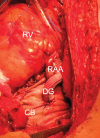Prior intake of new oral anticoagulants adversely affects outcome following surgery for acute type A aortic dissection
- PMID: 35258082
- PMCID: PMC9252133
- DOI: 10.1093/icvts/ivac037
Prior intake of new oral anticoagulants adversely affects outcome following surgery for acute type A aortic dissection
Abstract
Objectives: Oral anticoagulation prior to emergency surgery is associated with an increased risk of perioperative bleeding, especially when this therapy cannot be discontinued or reversed in time. The goal of this study was to analyse the impact of different oral anticoagulants on the outcome of patients who underwent emergency surgery for acute type A aortic dissection (ATAAD).
Methods: This was a single-centre retrospective study of patients treated with oral anticoagulation at the time of surgery for ATAAD. Outcomes of patients on new oral anticoagulant (NOAC) therapy were compared to respective outcomes of patients on Coumadin. Additionally, a survival analysis was performed comparing these 2 groups with patients who were operated on with no prior anticoagulation.
Results: Between January 2013 and April 2020, a total of 437 patients (63.8 ± 11.8 years, 68.4% male) received emergency surgery for ATAAD; 35 (8%) were taking oral anticoagulation at the time of hospital admission: 20 received phenprocoumon; 14, rivaroxaban; and 1, dabigatran. Compared to Coumadin, NOAC was associated with a greater need for blood-product transfusions and haemodynamic compromise. Operative mortality was 53% in the NOAC group and 30% in the Coumadin group. A 5-year survival analysis showed no significant difference between the NOAC and the Coumadin group (P = 0.059). Compared to 402 patients treated during the study period without anticoagulation, patients taking NOAC had significantly worse survival (P = 0.001), whereas that effect was not observed in patients undergoing surgery who were taking Coumadin (P = 0.99).
Conclusions: Emergency surgery for ATAAD in patients taking NOAC is associated with high morbidity and mortality. NOAC are a major risk factor for uncontrollable bleeding and haemodynamic compromise. New treatment strategies must be defined to improve surgical outcomes in these high-risk patients.
Keywords: Acute aortic syndrome; Aortic dissection; Bleeding; Coumadin; DOAC; NOAC; Oral anticoagulation; Type A dissection.
© The Author(s) 2022. Published by Oxford University Press on behalf of the European Association for Cardio-Thoracic Surgery.
Figures



Similar articles
-
Drug Utilization Pattern of Oral Anticoagulants in Patients with Atrial Fibrillation: A Nationwide Population-Based Study in Korea.Adv Ther. 2022 Jul;39(7):3112-3130. doi: 10.1007/s12325-022-02151-z. Epub 2022 May 7. Adv Ther. 2022. PMID: 35524839 Clinical Trial.
-
Association Between Use of Non-Vitamin K Oral Anticoagulants With and Without Concurrent Medications and Risk of Major Bleeding in Nonvalvular Atrial Fibrillation.JAMA. 2017 Oct 3;318(13):1250-1259. doi: 10.1001/jama.2017.13883. JAMA. 2017. PMID: 28973247 Free PMC article.
-
Oral anticoagulation management in patients with atrial fibrillation undergoing cardiac implantable electronic device implantation.Clin Cardiol. 2017 Sep;40(9):746-751. doi: 10.1002/clc.22726. Epub 2017 May 19. Clin Cardiol. 2017. PMID: 28543401 Free PMC article.
-
Unanswered questions and research priorities to optimise stroke prevention in atrial fibrillation with the new oral anticoagulants.Thromb Haemost. 2014 May 5;111(5):808-16. doi: 10.1160/TH13-09-0741. Epub 2013 Nov 28. Thromb Haemost. 2014. PMID: 24285341 Review.
-
Non-Vitamin K Antagonist Oral Anticoagulants and Antiplatelet Therapy for Stroke Prevention in Patients With Atrial Fibrillation: A Meta-Analysis of Randomized Controlled Trials.Cardiol Rev. 2016 Sep-Oct;24(5):218-23. doi: 10.1097/CRD.0000000000000088. Cardiol Rev. 2016. PMID: 26274538 Review.
Cited by
-
Factors Associated with Early Mortality in Acute Type A Aortic Dissection-A Single-Centre Experience.J Clin Med. 2024 Feb 10;13(4):1023. doi: 10.3390/jcm13041023. J Clin Med. 2024. PMID: 38398336 Free PMC article.
-
Management of Direct Oral Anticoagulants in Acute Type A Aortic Dissection.Aorta (Stamford). 2024 Dec;12(6):131-137. doi: 10.1055/a-2542-4290. Epub 2025 May 8. Aorta (Stamford). 2024. PMID: 40341450 Free PMC article.
-
Aortic wrapping is life-saving in high-risk acute aortic dissection and intramural haematoma.Interact Cardiovasc Thorac Surg. 2022 Oct 10;35(5):ivac254. doi: 10.1093/icvts/ivac254. Interact Cardiovasc Thorac Surg. 2022. PMID: 36205640 Free PMC article.
-
Apixaban removal during emergency surgery for type A acute aortic dissection: a prospective cohort study.Int J Surg. 2024 Dec 1;110(12):7782-7790. doi: 10.1097/JS9.0000000000002137. Int J Surg. 2024. PMID: 39806740 Free PMC article.
-
Conservative treatment of type A aortic dissection: a case report with 5 years of follow-up.AME Case Rep. 2023 Oct 13;7:42. doi: 10.21037/acr-22-107. eCollection 2023. AME Case Rep. 2023. PMID: 37942037 Free PMC article.
References
-
- Weitz JI, Pollack CV. Jr.. Practical management of bleeding in patients receiving non-vitamin K antagonist oral anticoagulants. Thromb Haemost 2015;114:1113–26. - PubMed
-
- Pollack CV Jr., Reilly PA, van Ryn J, Eikelboom JW, Glund S, Bernstein RA. et al. Idarucizumab for dabigatran reversal—full cohort analysis. N Engl J Med 2017;377:431–41. - PubMed
-
- Debakey ME, Henly WS, Cooley DA, Morris GC Jr., Crawford ES, Beall AC. Jr.. Surgical management of dissecting aneurysms of the aorta. J Thorac Cardiovasc Surg 1965;49:130–49. - PubMed
-
- Daily PO, Trueblood HW, Stinson EB, Wuerflein RD, Shumway NE.. Management of acute aortic dissections. Ann Thorac Surg 1970;10:237–47. - PubMed
MeSH terms
Substances
LinkOut - more resources
Full Text Sources
Medical
Miscellaneous

